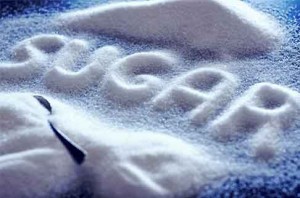 The other day, I was reading the ingredients for a so-called “healthy” snack bar that I was eating. The first ingredient listed was brown rice syrup. Though everyone knows that brown rice is healthy, syrup is often a code word for sugar. So, I did what any connected consumer might do.
The other day, I was reading the ingredients for a so-called “healthy” snack bar that I was eating. The first ingredient listed was brown rice syrup. Though everyone knows that brown rice is healthy, syrup is often a code word for sugar. So, I did what any connected consumer might do.
I Googled it.
Turns out, brown rice syrup is a sweetener. And though it’s often organic and it does contain some trace vitamins and minerals, it’s really just another word for sugar. In other words, despite the deceptive labeling, the primary ingredient for my snack bar was none other than sugar.
Surely, I wasn’t the only one fooled by the packaging. And so I thought it would be helpful to put together a list of other food ingredients that are really just sugar in disguise.
- Barley malt.
- Beet sugar.
- Brown sugar.
- High fructose corn syrup.
- Corn sugar.
- Cane sugar.
- Corn syrup.
- Brown rice syrup.
- Cane-juice crystals.
- Carob syrup.
- Yellow sugar.
- Date sugar.
- Dextran.
- Dextrose.
- Diatase.
- Diastatic malt.
- Levulose.
- Ethyl maltol.
- Fructose.
- Glucose.
- Grape sugar.
- Fruit juice.
- Maltose.
- Maltodextrin.
- Honey.
- Fruit juice concentrate.
- Raw sugar.
- Sucrose.
- Sorbitol.
- Molasses.
- Mannitol.
- Demerara sugar.
- Galactose.
- Maple syrup.
- Panocha.
- Powdered sugar.
- Confectioner’s sugar.
- Treacle.
- Turbinado sugar.
- Caramel.
- Ethyl maltol.
- Treacle.
- Sorghum syrup.
- Muscovado sugar.
- Agave.
Consumers beware! Labels tend to be very tricky and manufactures go to great lengths to make their products seem healthier. If you see any of the above ingredients, know that that it’s just another name for sugar.
If you can think of any additional names for sugar, share them in the comments below!









Nice reminder to everyone! FYI, though, you have treacle listed twice. :-/
Kate, you are way good!
I have been doing this for almost a year. If you want to add to my list, please feel free. If you want to pick the list up, please add attribution.
https://www.facebook.com/notes/single-mans-kitchen/all-the-249-names-of-sugar-so-far-project/10150839799498198
Hey Davey! I love your blogs, videos, and fitness articles! I was reading through the list of different sugar names and one that jumped out at me was “Panocha.” lol I couldn’t help but laugh when I saw that because in Spanish, Panocha is slang for pussy, haha.
Thanks for pointing this out. I love your blog and videos. I’m always on the lookout for synonyms of foods I try to avoid. My tolerance for MSG is pretty bad, and I recently discovered that there are a ton of alternative names for it, several of which can be included in the same meal/food item (e.g. any kind of “extract”). It’s almost inescapable to avoid, unless cooking everything yourself. I found this list to be helpful.
http://www.theindigoearth.com/articles/my_first_article
When did it become pro forma to excise something that is required for daily nutrition? Whatever happened to portion control and not denying the body the glucose that it needs for glycolysis, which keeps us alive?
Cutting sugar out entirely, or severely limiting it in diet is insane since it has a habit of causing ketosis when left unchecked, and can further devolve into ketoacidosis which can be lethal. If ketosis is the goal, there are better ways to lose weight and/or lead a healthier lifestyle than to tax the body under such extreme conditions in my opinion.
Some of the sugars you have listed are sugar alcohols that are less bad for you than regular sugars. When you see sorbibol, maltitol, xylitol, and the like on labels, you know they’re sugar alcohols.
BTW, Davey, you listed Ethyl Maltol twice at positions 18 and 41.
Warning about the sugar content is all great, but I feel that you could have made a point of explaining further why those carbohydrates are bad.
You could’ve added that we should look for products with polysaccharides, which amongst other carbohydrates are starches that the body has to break down into monosaccharides before it can be used, but also cellulosis that the body can’t digest and which helps in the digestion process. That said, the body needs sugar, but it should come through the fruit and vegetables, the meat and cereals where the sugar doesn’t go stright into the bloodstream, but is spread out over a longer span of time.
yeah-i read these health bars-energy bars-before i workout.i go to a health food store-to make the right choice.so many ingredients calling themselves sugar-thanx for the info.this just reminds me what to look out for.
But but but- I like honey D:
Davey! #15, Dia[s]tase is actually an enzyme that breaks down sugars, not a sugar itself. Whenever you see -ase at the end of a biological compound, it means it’s an enzyme.
I see in your list honey
it’s not the same of sugar/glucose/fructose for example. Honey is sweet and caloric but the amount of calories por tsp is lower and honey is balanced. sugar is not a source of nutrition, honey it is. the effect on the body is completely different and nonetheless honey brigs calories, its effect on the body is completely different. I think a mention needs to be done.
thx for your hints
Alessandro